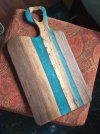StoneAndSteel
Gold Member
- Joined
- Feb 24, 2019
- Messages
- 909
That is probably why end grain is easier on the blade.
That's the theory. And, while I am not an expert on any such thing, that has been my experience. Plastics, glass, and bamboo (particularly the bamboo) all seem to dull my knives faster than my end-grain butcher block. The butcher block requires a little maintenance--in contrast to the zero maintenance of a plastic or glass board-- but it's worth it in my mind to not have to sharpen my knife mid-turkey. The walnut end-grain is also pretty on the counter which is a bonus. My wife actually was happy with the purchase after she saw it on the counter for a few days.

 ). Cost a' doin' business I guess..
). Cost a' doin' business I guess..
